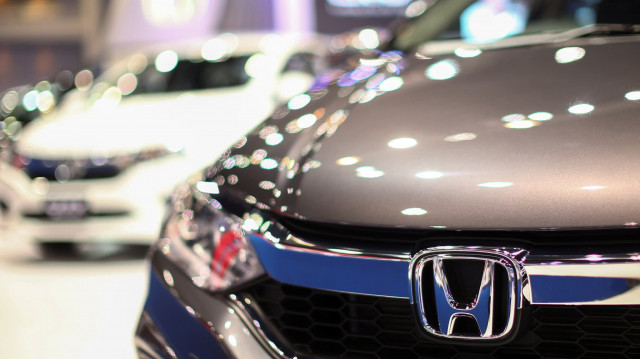In Pakistan, carmakers dismiss talk of plant shutdown
Says company will continue non-production days as sales plunge

PHOTO: REUTERS
“Company will continue non-production days,” said an Indus Motor spokesperson while dismissing rumours of a complete shutdown of its production plant.
Separately, Honda Atlas vehicle dealer Shaheen Anwar of Faisal Automobile told The Express Tribune that they had received no news of plant closure by Honda. Two other sources in the market also confirmed the continuation of prior production schedule.
Sales of the auto sector have continued to suffer from the dwindling economy. In September 2019, sales of cars and light commercial vehicles dipped 39% compared to the same period of previous year.
Honda and Toyota sales dropped 68% and 57% year-on-year respectively during the month. However, Pak Suzuki Motor Company sales contracted by a relatively lower 18% year-on-year, except for new Alto 660.
“Alto sales came in at 4,924 units in September 2019 – the highest monthly sales for a Suzuki car model,” remarked Ahmad Lakhani, an analyst at JS Research.
The previous record high for monthly sales was 4,648 units of Mehran, according to data compiled by the Pakistan Automotive Manufacturers Association (Pama).
“Although they (Suzuki) have not yet closed their plant primarily due to strong Alto demand, we need to keep in mind that it is they who have recorded losses for three consecutive quarters, which is not the case for the other two,” said the analyst.
“The country is going through an economic slowdown and the overall market has remained volatile. The factors largely contributing to this include rupee depreciation, reduction in car financing, increase in federal excise duty and higher input costs,” said a spokesman for Indus Motor. “This has indeed been a great struggle.”
Over a 12-month period, the rupee depreciated over 31.6%. Additionally, the government has imposed 7% additional customs duty, 3% additional sales tax on all imports and 7.5% federal excise duty on vehicles of 2,000cc and above, he said.
There is also a fresh federal excise duty of 2.5% and 5% on locally manufactured vehicles. “All this is having an adverse impact on the auto sector and has resulted in a major decline in sales. Of the total cost of a vehicle, 40% comprises taxes and levies imposed by the government,” he said.
“It is a misconception that the rising rate of tax will not affect vehicle sales and total tax collection; in fact, the decline in sales will result in a decline in tax collection from the auto sector,” he added.
“Yet, we have decided not to go for layoffs despite the hard times. We are absorbing this financial crunch.”
Published in The Express Tribune, October 16th, 2019.
Like Business on Facebook, follow @TribuneBiz on Twitter to stay informed and join in the conversation.



















COMMENTS
Comments are moderated and generally will be posted if they are on-topic and not abusive.
For more information, please see our Comments FAQ